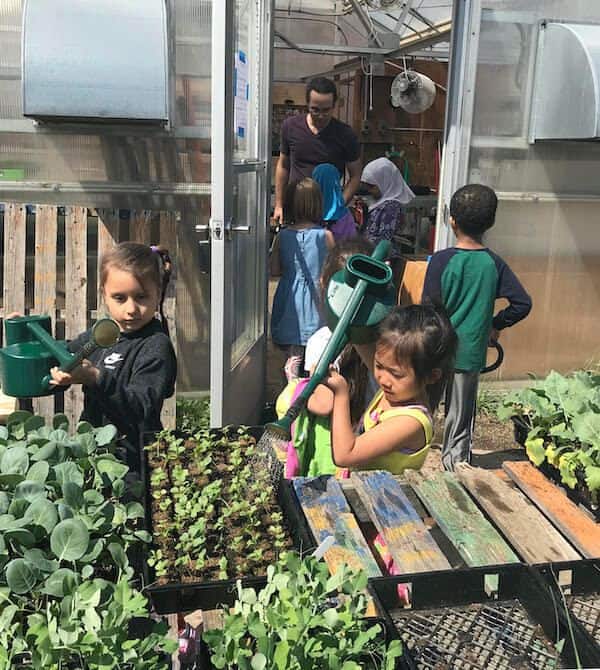“We are a youth development organization that just happens to use food as a medium for social change.” That's Marcus Kar, North Minneapolis Director of Programming for Youth Farm.
Established “way back” in 1995, Youth Farm was an organization ahead of its time. When Youth Farm began doing this type of work, urban agriculture had no cool factor. The phrase “farm to table” was just making its way into mainstream vernacular.
And now, twenty-five years later, they’re still growing strong in the twin cities of Minneapolis and St. Paul—creating jobs and leadership opportunities for 16- to 24-year-olds and providing community events and school-based gardening activities for younger kids.
Youth Farm operates 10 total farm sites, five in each city. Most programming takes place in St. Paul’s Frogtown and West Side neighborhoods and in North Minneapolis. All three of these neighborhoods share similar challenges.
“Quality youth programming is lacking, employment opportunities for young people are limited, and these areas are considered food deserts,” explains Youth Farm Executive Director Gunnar Liden.
The organization offers programming to address these concerns while also fostering leadership and getting kids more connected and actively involved with the local community.
“Our work is made for neighborhoods like this,” says Marcus. “We’re engaging kids around food and trying to help them find their personal voices and create their own possibilities, their own futures.”
Every year, Youth Farm engages more than 1,500 youth and employs around 25 teens and five young adults as part of their Farm Stewards Program.
“The goal is to introduce them to their first job, but instead of starting their working lives at McDonald’s or a place where they’re just pushing buttons, we get them involved in the community,” Marcus says. “We’re not necessarily looking for these young people to become farmers. We want them to understand food and their connection to their world better.”
It’s an empowering opportunity at just the right time for many Youth Farm members on the cusp of adulthood.
“We put young people in a position to analyze and make decisions,” Marcus explains. “We offer developmentally appropriate ways for them to have roles of decision making and leadership. They come to understand the connection between their decisions and a success or a failure. They have a place where they are listened to, their decisions are valued.”
Youth Farm’s progressive model also allows kids to start young and move up through the ranks of the program, taking on additional responsibilities and challenges as they grow up.
Kids as young as nine can start as volunteer youth farmers after school and in the summer. At 12 to 13, they can graduate to volunteer All Stars with a focus on role modeling for the younger kids and learning about food systems.

At 14 to 18, kids can apply for Project LEAD, a paid, part-time internship that includes managing the younger workers, assisting with all phases of growing and distributing food, and organizing community events and projects.
A handful continue on with employment as Farm Stewards. These 19- to 24-year-olds manage the farm, nurture community partnerships, and implement programming. They also receive support in pursuing career and academic goals, whether related to farming or not.
“The roles from All-Star to LEAD and now to a Farm Steward have shown me how I can move up in life,” says Sergio Arredondo, North Minneapolis Farm Steward. “With every role there are new responsibilities and challenges, and this allows me to work on myself.”
The Youth Farm team is currently renovating a 5,000-square-foot greenhouse in North Minneapolis with support from Whole Kids Foundation. Since it can be used year-round, the facility will create five additional full-time jobs and connect dozens more kids with leadership opportunities and environmental literacy education.
“The resources Whole Kids Foundation brought to us have made it possible to spend the appropriate time on planning and execution of the greenhouse. It’s been like gold to us,” Gunnar says.
Through its school partnerships, Youth Farm also provides year-round activities for kids in the community, including classes on urban gardening, healthy eating, and cooking. There are local farm tours and a summer lunch program. At one school, Marcus worked with a group of sixth graders to build a hydroponic gardening system. At another, he runs an after-school program.
Bringing groups of people together where they feel connected is at the heart of Youth Farm’s mission and its decades-long success.
“We are a diverse community made up of kids, teenagers, parents, farmers, athletes, musicians, cooks … all with a common goal of creating a place where young people can go to feel safe, have fun, build close friendships, and grow,” says Antonio, a Frogtown Project LEAD. “This is what sets Youth Farm apart.”



